Celebrate World Theatre Day with our collection of fifteen plays that have taken the stage by storm and even made their way to the silver screen.
From ancient Greek tragedies and flamboyant comedies of manners to biting social satires, these scintillating plays continue to spark new discussions, challenge our perceptions and stir new emotions among theatre connoisseurs and book lovers.
And since a trip to Broadway is off the cards for the foreseeable future, we invite you to pick a book and discover the allure of theatre from the comfort of your own home.
Contents
- The Importance of Being Earnest by Oscar Wilde 19th century
- Much Ado About Nothing by William Shakespeare
- Six Degrees of Separation by John Guare
- Pygmalion by George Bernard Shaw
- Tartuffe by Molière
- Copenhagen by Michael Frayn
- Death of a Salesman by Arthur Miller
- The Changeling by Thomas Middleton and William Rowley
- Oedipus The King by Sophocles
- The Cherry Orchard by Anton Chekhov
- The Crucible by Arthur Miller
- A Streetcar Named Desire by Tennessee Williams
- The Servant of Two Masters by Carlo Gondoni
- Machinal by Sophie Treadwell
- Ghosts by Henrik Ibsen
The Importance of Being Earnest by Oscar Wilde 19th century
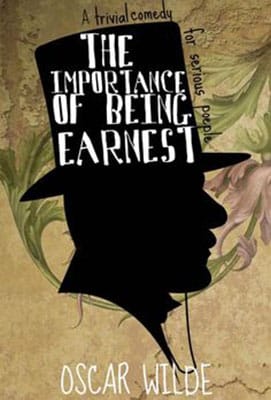
Written at the turn of the 19th century, The Importance of Being Earnest tackles come moral issues satirising the customs of Victorian England. This lighthearted farcical comedy about mistaken personae and secret affairs follows the lives of immoral, yet charming Algernon Moncrieff and seemingly responsible John Worthing. Two bachelors switch their fictitious identities in order to avoid burdensome social conventions by escaping to the countryside and back to London. When plotting and scheming become their second nature, the two gentlemen become inextricably entangled in the web of lies, where a pure miracle is their only hope. Brimming with witty banter and sharp humour, the play mocks the upper classes and its obsession with conformity to Victorian social standards.
Read it Free Here Buy it on AmazonMuch Ado About Nothing by William Shakespeare
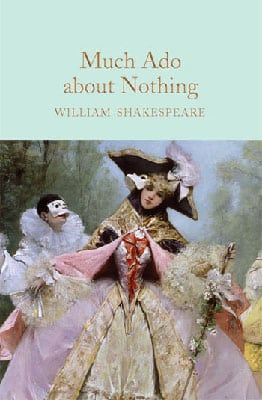
One of the most dazzling comedies ever written, Much Ado About Nothing combines the elements of satire and reflection on the issues of war, politics, love and chivalry. Set in Sicily, the story features two pairs of lovers. While Claudio and Hero represent a conventional and insipid couple whose prospective marriage is jeopardised by the false accusations of Hero’s infidelity, the same cannot be said about Benedict and Beatrice.
Their turbulent love-hate relationship prompts the young lovers to engage in a “merry war of wits” characterised by scalpel-sharp humour, witty one-liners and a crackling fire of dialogues. The first English comedy of manners satirises aristocratic behaviour and criticises social standards in the 16th century.
Read it Free Here Buy it on AmazonSix Degrees of Separation by John Guare

Six Degrees of Separation is a modern American classic play: an explosive comedy that exposes white middle-class hypocrisy and prejudice. The play first opened off-Broadway in 1990 and, after receiving standing ovations and numerous accolades, it was produced internationally and made into a blockbuster film in 1994.
The play is a sharp and serious exploration of the individual in society and the values or beliefs which motivate them. A young African-American man gains access to the homes of upper-class New Yorkers by pretending to be the son of actor Sidney Poitier. Treated with suspicion and then affection, he soon wreaks havoc in their comfortable lives.
Buy it on AmazonPygmalion by George Bernard Shaw

“The story revolves around a poor, but content with one’s situation, flower girl, Eliza Doolittle, who disgraces the beauty of English Language, with odd pronunciations and vulgar phonetics. This disturbing sight alarms proud and superior Professor Higgins, a bystander who observes her Cockney accent. His boastful and arrogant nature does not allow him to listen to insult to the language and he starts accusing the commoner of the sin she has just committed. He then places a bet against his old friend Colonel Pickering to pass her as a duchess in the Buckingham Palace by improving her language and turning her into a sophisticated lady.
The story takes an unexpected turn, when while teaching his pupil, he falls in love with his own creation. His arrogance meddles with his feelings and hurts Eliza’s sentiments. Would his pride and conceit let him prove his love towards her or just treat her like a commoner and end his experiment?” – A. Singhal
Buy it on AmazonTartuffe by Molière
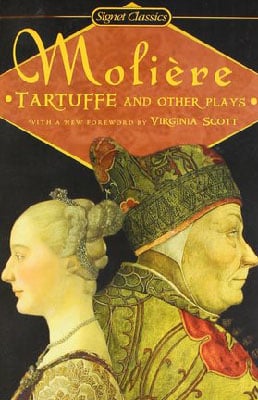
“With scathing satire, gorgeous poetry, clever word choice, and a beautiful English translation, Tartuffe viciously attacks religious hypocrites who posture and preen in public and their victims who are foolish enough to believe that holiness can only be measured by the outward show of morality. Moliere utilizes the sharp-witted servant girl motif to provide a cutting Greek chorus and to propel the action in a way that the obedient daughter stereotype cannot. In the end, hypocrisy is exposed for the ugly stain that it is, and punished with humiliation and repudiation.”- A. Mardoll
Read it Free Here Buy it on AmazonCopenhagen by Michael Frayn
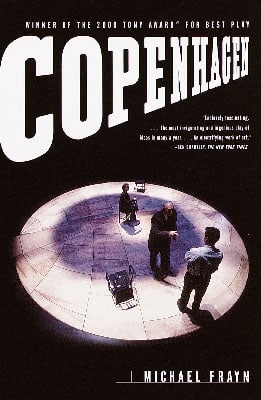
“Copenhagen is based on a real meeting that occurred in 1941 between physicists Werner Heisenberg and Niels Bohr. They were both working on secret government weapons projects, and they found themselves working for opposite alliances during WWII. There is debate over what they talked about at their meeting. This play imagines the conversations they might have had. Both characters are passionate about science, but they have complicated feelings about their actions during the war and how their work will be used by people in power. This is a play about memory, ambition, and regret.”- A.J. Sterkel
Death of a Salesman by Arthur Miller
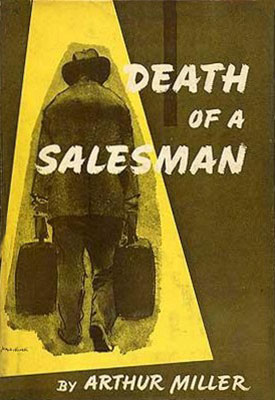
This multi-award winning drama is nothing short of remarkable. Set in the 1950s, Arthur Miller’s masterpiece follows the life of an ageing salesman Willy Lowman who becomes disenchanted with elusive American Dream. For Lowman, a forty-year ‘rat race’ spent chasing the promise of financial prosperity comes to an abrupt and tragic end. At his deathbed, surrounded by friends, the salesman comes to the realisation that his plans to provide a better future for his family have not materialised. Brilliantly written play exposes the flaws of the class system through the life of a blue-collar worker, who falls a victim of industrialism in his desperate attempts to shake off the inferiority complex that has pervaded the American nation since 1930s.
Buy it on AmazonThe Changeling by Thomas Middleton and William Rowley
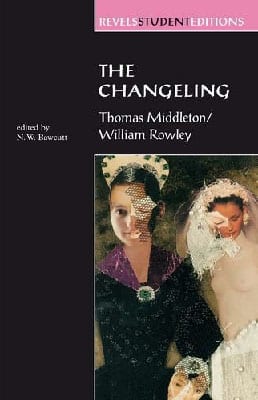
“Dark, powerful, and unsettling, Middleton and Rowley’s ‘The Changeling’ is a tale of jealousy, unrequited affections and lust; and thus provides a deeply troubling, and fascinating portrayal of love. The play has two plots- the first chronicles the love of Beatrice for Alesmero, a feeling which clashes with her supposed duty to marry Alonzo de Piracquo; and she manipulates a servant, De Flores, who possesses an unrequited love for Beatrice, to put Alsemero out of the picture. The other plot poses similarly worrying questions about the darker side of love, with the esteemed doctor, Alibius, locking up his young and beautiful wife Isabella, and trying to test her faithfulness by plying her with his contacts, who appear in disguise. Both of these plots have a good narrative thread, and are engaging. The tale of De Flores is one of the best evocations of obsessive love of Renaissance literature, and his asides to himself, provide perhaps his best and most revealing dialogue.”-D.Burin
Buy it on AmazonOedipus The King by Sophocles
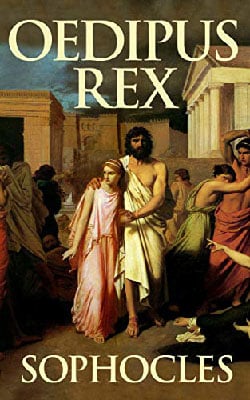
“Oedipus is a moral man. So moral in fact that when he finally has a proof of murdering his own father and marrying his own mother Jocasta, he tears “the golden brooches that upheld her queenly robes, upraised them high and shot full on his eyeballs”. Oedipus’ morality may be perceived as foolish. Like a judge forced into attrition by Fate, he demands witnesses and evidence to prove his own disaster. After blinding himself as punishment, the once famous and proud king Oedipus then demands to be exiled. Oedipus was always meant to meet this end by the gods. Or was he? What about Free Will? Here’s what his wise mother/wife Jocasta tells him before she hangs herself: “Why should a mortal man, the sport of chance, without no assured foreknowledge, be afraid? Best live a careless life from hand to mouth. This wedlock with thy mother fear not thou. How oft it chances that in dreams a man has wed his mother!”- Addy
Buy it on AmazonThe Cherry Orchard by Anton Chekhov
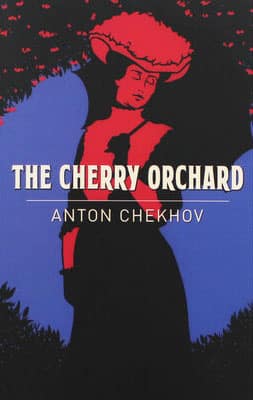
Written in 1903, “The Cherry Orchard” was Anton Chekhov’s final play, widely regarded as one of his greatest dramatic accomplishments. It is a story set during the decline of the aristocracy and the rise of an emergent middle class in Russian society at the turn of the 20th Century. Madame Ranevsky and her daughters have returned to their family estate, including its famous cherry orchard, to oversee the auction of the estate in order to pay the mortgage. Madame Ranevsky is paralyzed by the thought of losing the sentimental cherry orchard and all that the loss of the family estate represents and has no grasp of the financial and legal issues she faces. Rather than see her family’s property divided and sold off so that she can keep a small piece of it, it is instead sold to the son of a former serf. Ultimately the now destitute family leaves to the sound of the beloved orchard being chopped down, the symbolic and metaphoric end to an era.
Buy it on AmazonThe Crucible by Arthur Miller
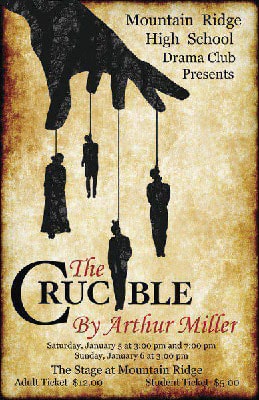
“Arthur Miller’s play has stood the test of time by virtue of its violent dramatic energy and deep political connections to today’s global surveillance societies. The cumulative power of the drama is felt in the way characters, from Parris to Hale to Hathorne to Danforth, build up the judgmental toxins that contaminate and destroy so many innocent lives. Miller takes the audience to the edge of hysteria and hallucinogenic madness in the testimony of Abigail Williams and is very good at detecting the raw nerve-endings of the Massachusetts Bay community of 1692 and how much any society can endure before it implodes into its own swamp of irrationality and fear.”- Jeremy A. Smith
Buy it on AmazonA Streetcar Named Desire by Tennessee Williams
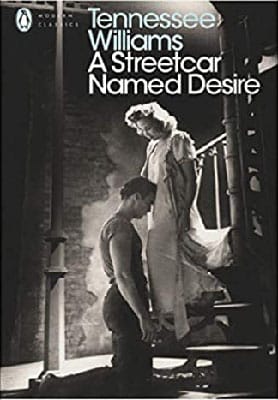
“Tennessee Williams also was ahead of his time in Desire by discussing social issues such as homosexual relationships, domestic violence and a woman’s monetary independence from her husband. He introduced the world to characters who have become archetypes for the post-war 1940s. Stella Kowalski, who is very much in love with her husband and submits to his every want and need. Her husband, Stanley Kowalski, a war veteran, who feels the need to gather with the men bowling or playing poker after work. And the sultry Blanche DuBois, Stella’s sister of an undetermined age. Fresh off of another failure, Blanche has taken a streetcar named Desire to spend the summer with Stella and Stanley Kowalski in their one bedroom apartment. Not only is there tension, Stanley immediately sees beyond Blanche’s gaudy clothes and jewelry and sets out to investigate her past. With only a sheet separating their living arrangements in a sweltering summer, the tension continues to escalate throughout the play.”- Brina
Buy it on AmazonThe Servant of Two Masters by Carlo Gondoni
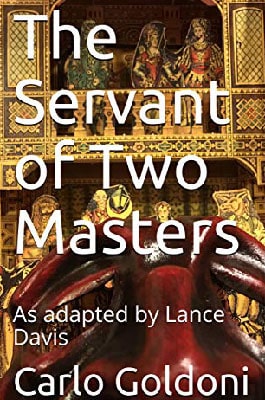
“Disguised lovers, tricky servants, and well-meaning parents cross and double-cross one another along the canals of Venice in Carlo Goldoni’s slapstick-filled, comic gem. The characters’ search for a happy ending depends entirely on the titular servant Truffaldino, who is constantly on the lookout for a decent meal. Truffaldino’s attempt to double his wages unravels with delicious mayhem in this joyous, 18th century lark.”- American Shakespeare
Machinal by Sophie Treadwell
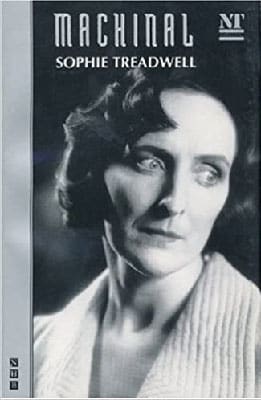
“Machinal is surprising adult and progressive play for being written in the 1920’s, because of its major emphasis on feminism. The Young Woman is controlled throughout the entire play. From her boss, to her husband, to even the man she chooses to have an affair with- every scene involves her being dictated to or controlled to do something, oftentimes against her own will, until we reach the key scene where she does choose… and society recoils at her one true decision. The world of Machinal is mechanical, claustrophobic, and disconnected- much like how the Young Woman must often feel. And that bleeds into the striking social commentary on women’s rights.”- Edward Cheer
Buy it on AmazonGhosts by Henrik Ibsen
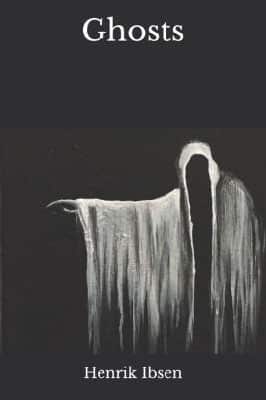
Helen Alving is a wealthy widow who was unhappily married to her unfaithful husband. In her bid to shelter her son from the corrupting influence of his father’s immoral behavior, she sends Oswald away only to discover that he is suffering from syphilis inherited from his father. Oswald has also unfortunately fallen in love with Regina, his mother’s maid, who is revealed to be Oswald’s illegitimate half-sister.
“Ghosts” is a scathing indictment of Victorian society in which Ibsen refutes the notion that if one simply fulfills one’s duty according to the morals of the time then a good and noble life is guaranteed. Scandalous in its day for its frank discussion of venereal disease, marital infidelity, incest, and euthanasia, “Ghosts” continues to resonant with modern audiences for its intense psychological drama and sharp social criticism.
Read it Free Here Buy it on AmazonStella
Stella is a Marketing Consultant and has been writing content for Full Text Archive since 2015. When she is not writing, she is meticulously planning our social and e-mail campaigns. Stella holds a bachelor’s degree in English and Russian Literature, which has provided a broad foundation from which she continues to explore the written world.
She spends her free time reading, visiting old castles and discovering new coffee shops. She can be reached at stella

